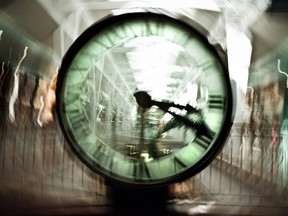Will this be the last year we fall back from daylight time? The Quebec government has launched a consultation on the topic.

Article content
Hope you enjoyed that extra hour of sleep in the wee hours of Sunday, because it may be one of the last times Quebec rolls back the clocks.
Daylight time ended this weekend in a broad swath of eastern North America, so it’s now brighter (for the moment) when we wake up in the morning — but darkness settles in much earlier in the evening.
Whether or not you got to indulge in more precious slumber Sunday morning, gaining an hour when the clocks fall back beats losing one when we spring ahead. But either way, adjusting the time is discombobulating, messing with the body’s circadian rhythms; increasing the risk of heart attack, stroke and other maladies; and contributing to accidents on the road or in the workplace. Plus, it’s just plain miserable, taking up to a week for everyone from babies to pets to recover from the shift.
Advertisement 2
Article content
So the government is taking the opportunity to sound out Quebecers on whether this tradition should continue — or be put to rest for good.
Quebec Justice Minister Simon Jolin-Barrette has launched a public consultation about the province’s adherence to daylight time, which includes a short online survey asking us if we’re for or against changing the clocks twice a year. Those in favour of ditching the switch are also asked where we should leave things: Do we stay on daylight time forever or stick with the schedule we’re on now?
If we go for daylight savings, the sun would rise on the longest day of the year at 4:51 a.m. and set at 8:43 p.m. It would then rise on the shortest day of the year at 8:27 a.m. and set at 4:59 p.m.
If we abandon daylight savings and maintain the current itinerary, the sun would rise on the summer solstice at 3:51 a.m. and set at 7:43 p.m. On the winter solstice, the sun would rise at 7:27 a.m. and set at 3:59 p.m.
While I’ve long been a proponent of doing away with the twice-yearly torture of playing with time, the devil is in the details. There are obvious advantages and disadvantages to each scenario.
Advertisement 3
Article content
If we go with daylight savings, it would mean rousing the kids and getting them off to school in the dark in late December and early January, a most dreary prospect. But it would be lighter heading home from work at the end of the day. And a later sunset in summer would also mean an extra hour for outdoor sporting activities like baseball games, soccer matches or swim meets.
If we nix daylight savings, it won’t be as dark for as long waking up in the winter. But the birds will be singing at an ungodly hour come June.
The prospect you prefer probably depends on whether you’re an early bird or a night owl. In my humble opinion, remaining on daylight time permanently seems like the best choice, despite the fact we would — ugh! — have to push the clocks forward at least one more time to achieve this result.
Quebec is just the latest jurisdiction to consider dropping the time change. In 2020, Ontario adopted a bill to stop toying with the clocks — but only if Quebec and New York state follow suit. New York also has taken steps to end the practice, but only if its near neighbours take the plunge.
Advertisement 4
Article content
The Atlantic provinces were interested when the U.S. was considering the Sunshine Protection Act. Initiated by Florida Sen. Marco Rubio in 2018, the legislation proposed making daylight time permanent. Congress has tossed it around a few times, but the bill has never gained enough traction to make it into law. With the Sunshine Protection Act stuck in limbo, (North) Americans are fated to keep tinkering with the time twice a year.
Certainly it would be better and easier if all these states and provinces acted in sync. But everyone seems to be waiting for someone else to make the first move.
Could Quebec get the ball rolling? We certainly are a distinct society with an independent streak. However, going it alone would surely come with economic consequences. But I’ll leave it to the business community or any other groups that might want to submit briefs for the government’s consultation to make those arguments.
Turning back the clocks is a disruptive nuisance that is no longer useful. So I hope this is one of the last times we have to do it — in Quebec or anywhere else.
Recommended from Editorial
Advertisement 5
Article content
Article content




Comments